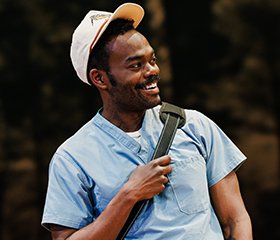Eight years ago, William Jackson Harper, who plays the doctor Astrov in LCT’s staging of Uncle Vanya, thought seriously about leaving acting behind. “I wanted my life to be about something other than getting up on a stage,” he told me. “I’d been doing the off-Broadway hustle for a while. It’s an existence that’s tight financially. And takes its toll emotionally. I thought I wanted out. I also write plays, so at least I could keep doing that.”
Fast-forward to the past month, when Harper, who grew up in the Dallas area, has received a Lucille Lortel award for his performance in Eboni Booth’s Primary Trust( this year’s Pulitzer Prize winner for Drama), a Drama Desk nomination for his work in that play, as well as a Drama League nomination for his performances in, jointly, Primary Trust and Vanya. And his Astrov has earned him a Tony nomination.
Harper’s trajectory from near-exit to recognized excellence has certainly involved artistic perseverance. It also had a practical side. In 2016, he got a gig on "The Good Place", an NBC fantasy-comedy. “That gave me some stability for a while,” Harper said. He also underwent personal development. “I do less posturing than when I was younger.” Has Harper, in a positive sense, grown into how Astrov describes himself in Act One of Heidi Schreck’s new version of Uncle Vanya: “a freak”? “In a way, yes,” Harper answered. “I’m not hiding my own eccentricities as much.”
Has that acceptance given him more confidence as an actor? “Sometimes,” Harper said. “But there are still the doubts about whether you’re good enough, even though I understand better now that that’s all part of it.” He added: “There was a point during Vanya rehearsals when I wondered whether I was out over my skis. I felt lost; I didn’t know what I was doing. It was very helpful to have Lila and Heidi there, two patient people” – Lila Neugebauer directed Uncle Vanya—"while I was floundering.”
Once the production moved into performance, Harper’s normal nightly professional jitters have been made more endurable by the presence of his Uncle Vanya castmates. “They are all,” he said, “open, committed, approachable, intelligent. You know when get to the theater that no night will ever be the same. Which is what you want, especially with Chekhov.”
To arrive at his own evolving interpretation of Astrov, Harper says he bored into the character’s core. “There’s this weird commingling of idealism and nihilism in him. Although it’s not in the text, I decided that Astrov’s complex emotions owed something to his becoming not just a doctor but a rural doctor. That was a rebellion against becoming a success in a more worldly way. Just as his concern about forests and the environment is a push against the way most humans treat nature.”
Nature, however, has made Astrov’s country life of shuttling long distances between patients less noble than the character had imagined. As the play’s Yelena mentions, his daily existence is one of “muddy roads, blizzards.” Those conditions have eroded Astrov’s optimism. “He’s turned into this person he hadn’t expected,” Harper said. “And maybe he just has to accept that.” I pointed out to Harper that Astrov is in his forties, which in 19th-century Russia was late middle-age: there’s not time left for Astrov to morph again meaningfully. Later in our conversation, I asked the actor if he knew that Chekhov died at forty-four, Harper’s current age. “Oh, yeah,” he replied. “I’m very aware of that.”
For Chekhov, 44 was autumnal. For Harper, it’s vernal. “Being able to do Primary Trust, a wonderful new play,” Harper said, “and Uncle Vanya, a classic, within a year? It’s what you go to school for.”
Brendan Lemon is a freelance journalist in New York.
